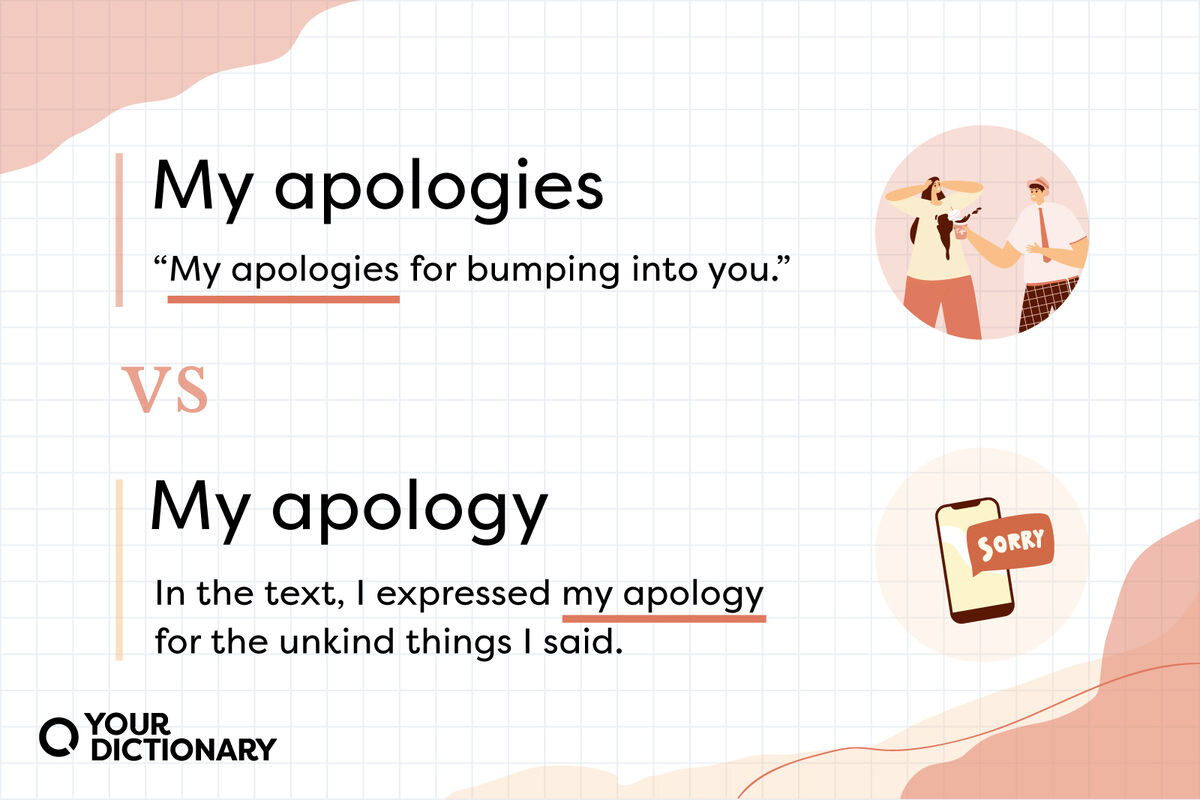
It’s important to be sincere and honest when you’re apologizing for something you’ve done. But does the plural “My apologies” carry more weight than the singular “My apology”? Both phrases refer to a feeling of regret, but only one of them actually means “I’m sorry” (even if you only sort of mean it).
“My Apologies” Means “I’m Sorry”
The word apology comes from the Greek apologia, meaning “a speech of defense.” Even though apologies is technically the plural version of apology, that’s not how we use it in English.
My apologies is an idiom that means “I feel regret” or “I’m sorry.” In this context, my apologies is short for the longer “Please accept my apologies,” which has a similar meaning to “I beg your pardon.”
- My apologies for bumping into you.
- I sent you the wrong directions? My apologies. I’ll send you the correct ones.
You can also use my apologies as an idiomatic statement for regret.
- Please give Harold my apologies; I won’t be able to attend the wedding.
- I made my apologies to the host before leaving early from the party.
When Do You Use “My Apologies”?
Because my apologies is a more formal expression than “I’m sorry,” you typically use it when:
- you’re trying to be polite in a social situation (“My apologies, I didn’t see you there.”)
- you’re RSVPing “no” to an event (“My apologies, I won’t be able to attend.”)
- you’re addressing a misunderstanding or mistake at work (“My apologies, let me send the attachment again.”)
Notice that you can separate my apologies from the rest of the sentence with a comma when using it to mean “I’m sorry.”
“My Apology” Means “That Time I Said I Was Sorry”
When you say “my apology,” you’re referring to a time when you said you were sorry.
The noun phrase is a literal description of someone’s statement of regret or remorse, not an idiom for “I’m sorry.”
- In the letter, I expressed my apology for the unkind things I said.
- The newspaper printed my apology in the editorial section.
Unlike my apologies, my apology doesn’t just relate to social situations. You also can’t use my apology as a synonym for “I’m sorry.”
You express my apology for a specific thing you said or did; you express my apologies for breaking social rules.
Is It “Please Accept My Apology” or “Please Accept My Apologies”?
The apology vs. apologies debate gets a little tricky when you’re asking someone to accept it (or them). Both “Please accept my apology” and “Please accept my apologies” are correct — depending on the context.
- Please accept my apology for breaking your lamp. (You’re apologizing for something specific.)
- Please accept my apologies for being late. (You’re being polite.)
You may also use “Please accept my apologies” when you’re issuing more than one apology. For example, if you’re apologizing for breaking the lamp, yelling at your friend, slamming their door, spreading rumors about them online, and crashing their car — yeah, you probably owe them more than one apology. But if it’s just one offense, “Please accept my apology” will do it.
More Ways To Say “I’m Sorry”
My apologies and my apology aren’t the only statements that express remorse. If “I’m sorry” isn’t the right phrase, try:
- Excuse me
- Pardon me
- Please forgive me
- Oops
- My bad
- My mistake